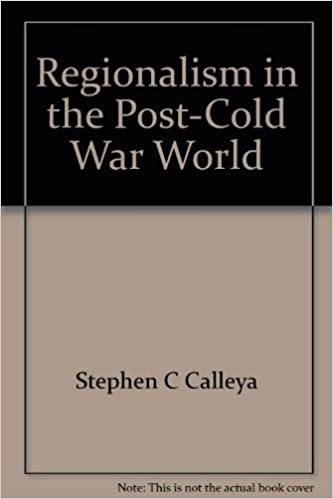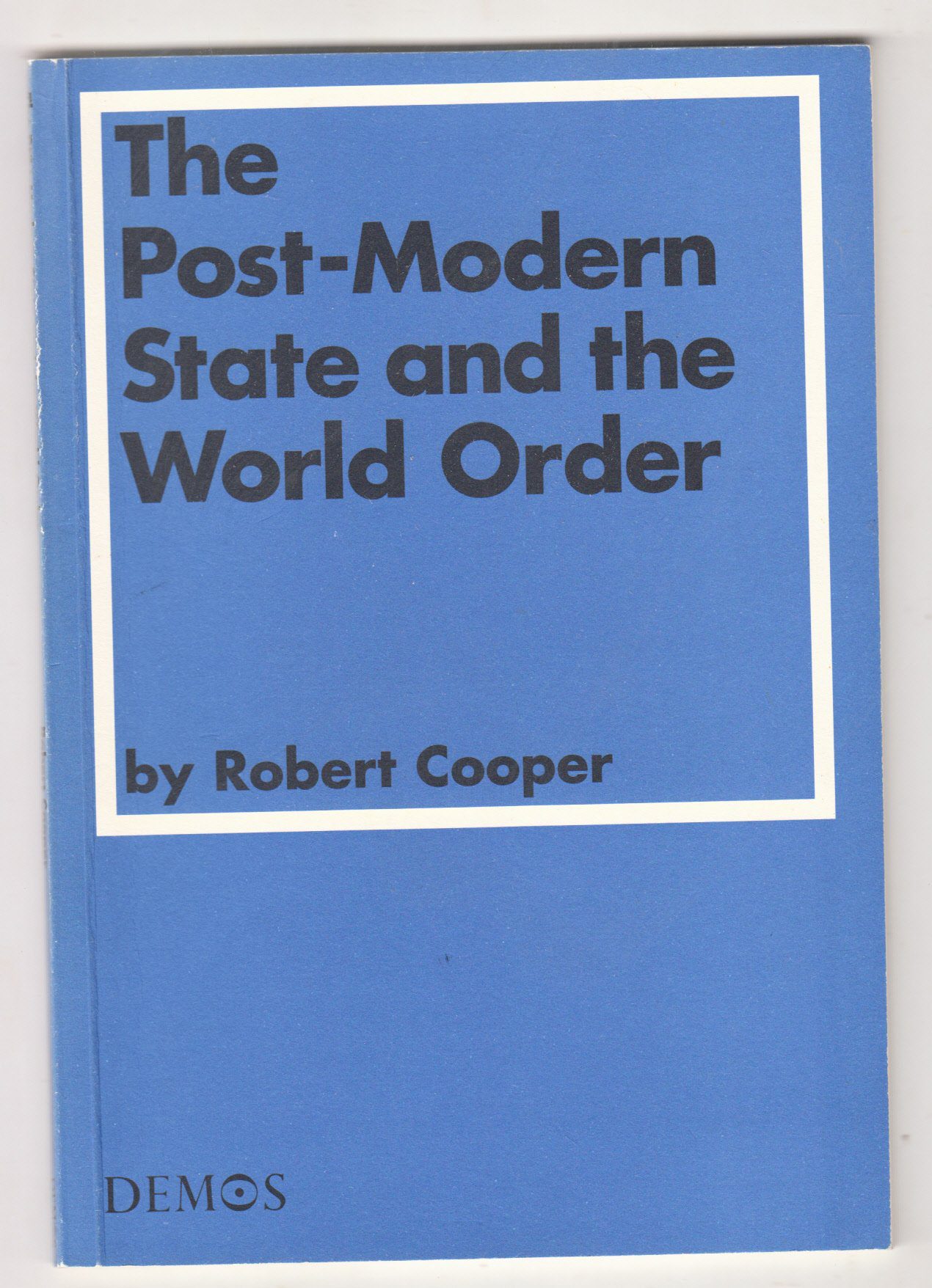Review: Aldo Matteucci
Robert Cooper is Director-General of External and Politico-Military Affairs for the Council of the EU and thus a man steeped in world affairs. Though he makes no claim to establishing a ‘theory’ of how nations grow and decay, he has presented in this slim volume a rigorous typology of today’s nations. His thoughts are worth setting out in some detail.
The state is built on force and legitimacy. Its legitimacy, and eventually the ruling regime, may crumble under the onslaught of new and critical ideas, or emerging new technologies of violence in the hands of neighbouring states or of social groups that the state does not control.
States face threats from within and without – failed states, nationalist and ideologically driven states, but also extremist groups. Anarchy and technology may overrun this century. What is a government to do?
After describing the current ‘state of the world and the state of the state’, Cooper concludes that if states are to master the new challenge of anarchy and technology they have to learn to make peace among each other. The strategies to achieve a new international order differ – hegemony, balance of power resp. multilateralism, and post-modern state structures are attempts to achieve the same result.
Empires emerged first – suppression of chaos and disorder was their legitimisation overlaid by a strong religious veneer. Empires were authoritarian, tendentially static, and prone to crumbling into anarchy.
Europe moved from a weak medieval system of imperial order providing little security for the populace to a modern pattern of strong but geographically limited sovereign authorities without any overarching framework of international law – domestic order was purchased at the price of international anarchy. The diversity of small European states created competition and social, political, and technological progress. As they refined their ‘means of destruction’ their legitimacy transmuted from divine right to mass society and democratic politics – often steeped in nationalism. Balance of power was the attempt – albeit inherently unstable – to prevent the system of competing states from either relapsing into chaos or falling under the hegemony of one of them. The Cold War was the culmination of this system, as both sides strove for hegemony, but had to make do with containment. It was unstable, however, as each side questioned the other’s legitimacy and attempted to undermine it. Liberal democracy, with its strong sense of identity and the idea of nation, won out, yet also destroyed the notion of empire.
With the end of the Cold War the world broke up into three:
The pre-modern world of pre-state or post-imperial chaos – the failed states. Defensive imperialism is the likely response of the rest of the world.
The modern world – with the separation of domestic and foreign affairs and the prohibition on external interference in the former. The accompanying world system is that of the balance of power, only refined into a worldwide collective-security system. The UN Charter represents an attempt to throw the weight of the international system behind the status quo. [This system is undermined by the parallel (and contradictory) postulate of ‘self-determination of the people’ [1] ]. Just as Europe’s system was undermined by the emergence of a new state (Germany) the emergence of new states (e.g. Islamist state) may threaten the balance. Such states may also have regional imperial ambitions.
The post-modern word – where states have replaced distrustful balance by openness: security is achieved by confidence-building, reciprocal verification leading to mutual transparency, and a common moral consciousness that applies to international relations as well as to domestic affairs. This approach has been extended to the economic area: here mutually agreed rules of behaviour have been created, leading to administrative integration. Economic security is achieved through transparency, and transparency through interdependence based on ‘policy preference’ and burden sharing. National identity, however, and democratic institutions remain wedded to the territorial state. Such a ‘loose’ super-structure allows expansion to any country that is prepared to share the same values. A regional focus of power emerges. More generally: ‘Making peace is as much a part of sovereignty as making war. For the post-modern state sovereignty is a seat at the table.’
The post-modern state is more pluralist, more complex, less centralised that the bureaucratic modern state. Its policy preference (rather than necessity of survival) dictates foreign policy, and media, popular emotion, and the interests of particular groups or regions come into play. In the end, nationalism yields to individualism in which multiple identities thrive and personal development and personal consumption have become central goals. Self-realisation replaces patriotism. As a corollary, foreign policy is the continuation of domestic concerns beyond national boundaries.
While the U.S. has allowed the post-modern state – and in particular the EU – to emerge, it is a robustly modern state whose approach to international relations is framed by the use of force and by military alliances.
Contrary to other modern states that are based on nation and history, the US was founded on ideas – its vocation is to spread them worldwide. As Octavio Paz said, America aims at colonisation not of space, but of time: that is, of the future. Because America is not wedded to history, it is likely to be unpredictable.
Having thus created a typology of the worlds in which we live, Cooper now moves to the issue of security therein.
Collective security protects the existing order and does no create a new one. It takes stability through balance to its logical extreme – a world body of overwhelming power (the world community) assists the victim of aggression. The Gulf War I was fought on this principle.
Since then we have moved on – in the Balkans the intervention was based on values. Interventions for values are far from easy. It is difficult to define the objectives and to verify that they were achieved. It is dangerous to become involved in war of principle: it is difficult to call them off if they go wrong and equally difficult to sustain them if casualties mount. Also, war is essentially destructive, thus poorly adapted to inculcate good behaviour. Furthermore, we may find ourselves in a world where ‘virtue runs amok’.
We have now moved on to preventative or precautionary wars – to stave off the danger of WMD. If everyone adopted a preventative doctrine the world could degenerate into chaos. Such a system is stable only under a hegemonic power or group. Whether it will last depends on the legitimacy the hegemon.
Chaos and anarchy cannot be simply contained, for they can spread, become a basis for crime, and become a security threat. Empire-style interventions must be voluntary and co-operative to achieve any lasting legitimacy and hence results. The post-modern model of the EU would be particularly useful in this context.
The author concludes by pointing out that chaos is tamed by empire; empires are broken up by nationalism; nationalism will give way, he hopes, to post-modern integration. There is nothing inevitable about the survival of the post-modern state, he cautions; both chaos and the modern state can become a threat. And such a state can wither from within, when devolution turns to disintegration of the state and deconstruction of society and ‘we may all drown in complexity’.
This brilliant essay is followed by an equally brilliant assessment on the art diplomacy in the 21st century. He articulates it around five maxims:
Foreigners are different;
In the end, what matters is domestic politics;
Influencing foreigners is difficult;
Foreign policy is not only about interests;
Enlarge the context.
And he proceeds to give a rich set of examples to flesh them out.
His last essay is on the relationship between the U.S. and the EU. He pleads for a common EU defence policy, and military armaments. He is aware that such a call to arms contradicts all that he has said about the EU as a post-modern state, yet he justifies is as a matter of expediency in a dangerous world. The ideas presented are worth a separate and critical review.
I’ll cherish Cooper’s little book and will return to it time and again for reflection and inspiration. It is not a blueprint for action, though. Its typology is akin to a description of chemical bonds. In many ways it is abstract – even too abstract. Each state has a history – including the U.S. Each state is unique, and cannot be reduced to type. There is little room in the analysis for phenomena like the worldwide emergence of fundamentalism. It cannot deal with the contingency of Israel. This is not a fault. For better or worse we need perspectives and orientation, rudimentary and unsatisfactory as they may remain. Cooper’s book is superior to many others of the genre.
Notes:
[1] This point is made in David Fromkin (1999), Kosovo Crossing – American Ideals Meet Reality on the Balkan Battlefields. Free Press, New York
Review by Aldo Matteucci









